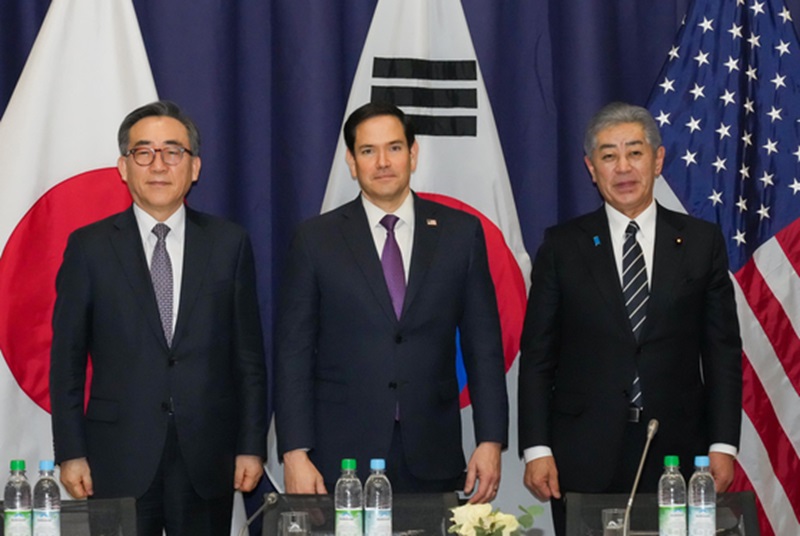Pyongyang on Tuesday condemned a recent joint statement by South Korea, the United States and Japan that reaffirmed their goal of achieving North Korea’s complete denuclearization, calling it an “impossible and impracticable” plan and a “failed old dream.”
A spokesperson for North Korea’s Foreign Ministry accused Washington of pursuing an “outdated and absurd plan” and asserted that denuclearization has become even “more impossible and impracticable even practically and conceptually” in an English-language statement released through the state-run Korean Central News Agency (KCNA).
The rebuke comes after the top envoys of South Korea, the United States and Japan — Cho Tae-yul, Marco Rubio and Takeshi Iwaya — met on Saturday during the Munich Security Conference in Germany, where they reiterated their “resolute” stance on achieving the “complete denuclearization” of North Korea, a goal long pursued by Washington and its regional allies.

North Korea declared that the idea of denuclearization is now a “failed old dream that dims in the memory of the present time.”
“It is the official stand of the DPRK government that it is not worth consideration to counter the stand of the U.S. escaping from reality and we condemn and reject the U.S. action in the most resolute tone,” a North Korean Foreign Ministry spokesperson said, referring to the country by the acronym of its official name, the Democratic People’s Republic of Korea.
The statement also reaffirmed North Korea’s commitment to nuclear development, vowing to “consistently adhere to the new line of bolstering up the nuclear force clarified by the head of state.” Pyongyang said it would use “all political and military tools in its hands” to counter what it described as “threat and blackmail” by “the U.S. and its vassal forces,” ensuring the protection of its sovereignty and security interests.
North Korea has recently ramped up its criticism of the United States, issuing a series of statements condemning Washington.
Analysts suggest this reflects Pyongyang’s commitment to its “toughest anti-U.S. counteraction” against the United States, a policy it formally outlined during an expanded plenary session of the 8th Central Committee of the Workers’ Party of Korea at the end of last year.
“North Korea, which had previously limited its warnings to commentaries, escalated its response by issuing an official statement once the phrase ‘complete denuclearization of North Korea’ was used,” said Hong Min, a senior researcher at the Korea Institute for National Unification. “Depending on how the U.S. administration reacts regarding North Korea’s nuclear program, North Korea may further raise the level of its response and take a more aggressive stance.”
Despite the harsh rhetoric, North Korea appears to be maintaining a level of restraint, according to experts.
North Korean leader Kim Jong-un and his powerful younger sister Kim Yo-jong have refrained from making direct remarks. Instead, lower-level officials, including the spokesperson for the Foreign Ministry and a defense policy director, have issued statements. Additionally, Pyongyang has avoided mentioning U.S. President Donald Trump by name, a possible indication that it is calibrating its approach toward Washington.
Some experts suggest that North Korea is carefully managing its stance as it waits for the Trump administration’s second-term North Korea policy to take shape.
“As long as South Korea, the United States and Japan maintain their hostile stance toward North Korea, the country will continue to uphold its nuclear force as a means of ensuring peace, sovereignty and self-defense,” said Yang Moo-jin, president of the University of North Korean Studies.
However, Yang added, “If hostile policies toward North Korea are abandoned, there is room for adjustments in its nuclear policy. For now, North Korea maintains the position that any discussion on denuclearization can only come after the United States drops its hostile stance.”
BY SEO JI-EUN [seo.jieun1@joongang.co.kr]




